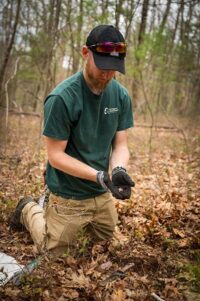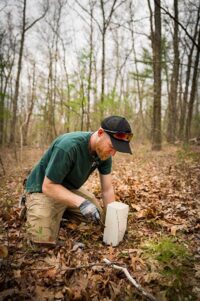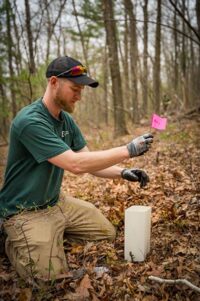Urban Tree Symposium
Friday, February 7, 2025, 9AM – 4:30PM
Location: New England Botanic Garden at Tower Hill
Friday, February 7, 2025, 9AM – 4:30PM
Location: New England Botanic Garden at Tower Hill
Urban Tree Symposium has ended. Thank you to everyone who attended this year!
New England Botanic Garden at Tower Hill’s annual Urban Tree Symposium is dedicated to exploring the importance of urban forests and ways we can improve our green spaces. The symposium brings together experts in the fields of forestry, horticulture, biology, technology and more. You can expect to hear current and important information that will impact your work in our communities and your own home. This event is co-hosted in partnership with the Ecological Landscape Alliance. CEU’s will be available. View the flyer here.
SPEAKERS
Robert “Lou” Allard, Urban and Community Forestry Program Coordinator
Rhode Island Department of Environmental Management
Rhode Island Urban Forests Technical Assistance Program
The Rhode Island Division of Forest Environment’s Urban and Community Forestry Program has partnered with the Green Infrastructure Center, a nonprofit organization based in Virginia, to launch a new comprehensive program to support urban forest planning and tree planting efforts within Rhode Island cities and towns. This program, with a focus on implementation within disadvantaged communities (as defined by the US Forest Service’s Climate and Equity Justice Screening Tool), works at both the municipal and community/neighborhood levels to help build urban forestry capacity.
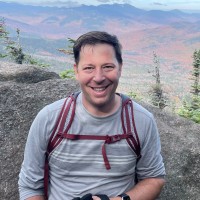
Nicholas Brazee, Extension Plant Pathologist
University of Massachusetts Amherst
Survival of the Fittest: Tree Health in the Concrete Jungle
Trees in our urban environments are increasingly recognized for the ecological, sociological and financial benefits they provide. Yet the negative impacts of climate change, introduced insect pests, and a multitude of diseases continues to create significant barriers to sustainable development. This talk will highlight novel pests and pathogens along with climatic stresses that threaten urban tree health and management strategies to combat these issues. Climate change and beech leaf disease will be highlighted as they represent the most significant urban and natural forest health issues. Work aimed at preserving historical and sentinel urban trees will also be discussed. Specifically, the use of non-destructive methods for internal decay detection to refine tree risk assessments.
Nicholas Brazee is an Extension Plant Pathologist at the University of Massachusetts. He directs the UMass Plant Diagnostic Lab, providing woody plant disease diagnostics and management support for green industry professionals. In addition, he conducts research on fungal pathogens of urban and landscape trees. Dr. Brazee has a Ph.D. in forest pathology from the University of Massachusetts.
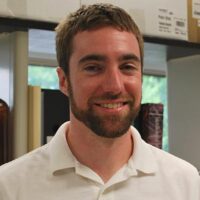
Richard W. Harper, Professor and Extension Urban Forester
University of Massachusetts Amherst
Understanding our Urban Forests
From climate change to compacted soils to spatial constraints, our urban forests experience a myriad of challenges. This lecture will discuss how our understanding and definition of urban forests has changed over time and will include actionable steps that we can take to foster and promote the health of our urban tree populations.
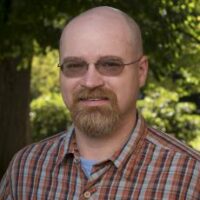
David Meshoulam, Co-founder and Executive Director, and
MarS McCormick, Associate Director
Speak for the Trees Boston
Advocating for Equity and Community Engagement in Boston’s Urban Forest
Creating meaningful change through urban forestry initiatives, Speak for the Trees Boston prioritizes equity, access, and community involvement in every aspect of their work. This session will explore their efforts to address environmental inequities by engaging diverse communities, building local partnerships, and enhancing urban green spaces as essential lifelines for city residents. Through innovative programs and advocacy, Speak for the Trees is fostering environmental stewardship, improving quality of life, and shaping a healthier, more sustainable Boston for future generations.
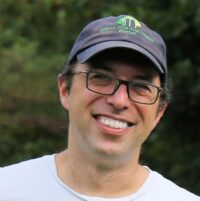
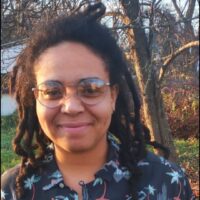
John Rogan and Deborah Martin, Professors of Geography
Clark University
Exploring Urban Tree Planting: Building Resilient and Equitable Cities through Research and Collaboration
This session delves into urban tree planting efforts in Massachusetts and Rhode Island, highlighting the vital role trees play in enhancing resilience, equity, and livability in urban areas. Drawing from years of collaborative research and on-the-ground initiatives, the talk will explore factors influencing tree health and survivorship, including community engagement, environmental conditions, and stakeholder practices. Attendees will gain insights into challenges, successes, and actionable strategies for fostering green spaces that act as lifelines for cities, improving quality of life and addressing climate impacts.
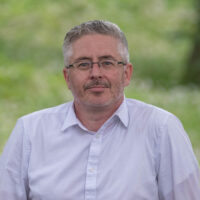
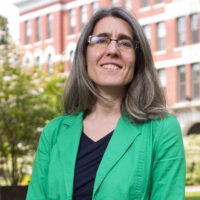
Robert Graham, Land Steward
New England Botanic Garden at Tower Hill
Planting Trees of Change: The Return of the Chestnut Tree
Join NEBG’s horticulturist and land steward, Robert Graham, as he shares the inspiring story of the American chestnut tree’s revival and its role in our landscapes. Learn about current restoration efforts, and examples of American Chestnut restoration efforts based in urban settings. Gain insights into the ecological significance of this iconic species and explore how planting these trees can foster a more resilient and sustainable future.
Robert Graham is the Land Steward at New England Botanic Garden at Tower Hill located in Boylston, MA. He has been with the organization since 2017 and is responsible for overseeing all formal groundskeeping as well as management of all naturalistic areas including meadows, woodlands, and wetlands. Robert earned his BS in Biology from Worcester State University where he focused on conservation biology and GIS. His professional interests include early successional habitats, native plant ecology, and sustainable land management.
Robert has played an instrumental role in New England Botanic Garden’s adoption of electric landscaping equipment, an important initiative that led to the organization being recognized as the first botanic garden in the nation to earn Green Zone certification from the American Green Zone Alliance.
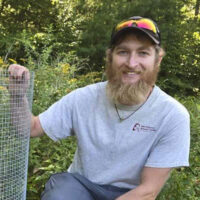
7:30 – 9:15 AM: Registration and Tea
8:15 – 8:45 AM (30 min): Early Morning Walk and Talk
Hunter Blanchard, Horticulturist I
Georgia Albanese, Land Steward
New England Botanic Garden at Tower Hill
Designing and Maintaining Trees in Urban Landscapes Kick off the day with an insightful walk through the garden led by our horticulturist and natural lands steward. From 8:15 to 8:45 AM, explore how tree design, plantings, and maintenance practices in our display areas can be applied to urban spaces. Gain unique perspectives on creating sustainable and visually striking landscapes from both cultivated and natural land management viewpoints.
9:00 – 9:15 AM: Welcome
9:15 – 10:15 AM (60 min): Rhode Island Urban Forests Technical Assistance Program
Robert “Lou” Allard, Urban and Community Forestry Program Coordinator
Rhode Island Department of Environmental Management
The Rhode Island Division of Forest Environment’s Urban and Community Forestry Program has partnered with the Green Infrastructure Center, a nonprofit organization based in Virginia, to launch a new comprehensive program to support urban forest planning and tree planting efforts within Rhode Island cities and towns. This program, with a focus on implementation within disadvantaged communities (as defined by the US Forest Service’s Climate and Equity Justice Screening Tool), works at both the municipal and community/neighborhood levels to help build urban forestry capacity.
10:15 – 10:30 AM (15 min): Break
10:30 – 11:30 PM (60 min): Understanding our Urban Forests
Richard W. Harper, Professor and Extension Urban Forester
University of Massachusetts Amherst
From climate change to compacted soils to spatial constraints, our urban forests experience a myriad of challenges. This lecture will discuss how our understanding and definition of urban forests has changed over time and will include actionable steps that we can take to foster and promote the health of our urban tree populations.
11:30 – 12:15 PM (45 min): Survival of the Fittest: Tree Health in the Concrete Jungle
Nicholas J. Brazee, Extension Plant Pathologist
University of Massachusetts Amherst
Trees in our urban environments are increasingly recognized for the ecological, sociological and financial benefits they provide. Yet the negative impacts of climate change, introduced insect pests, and a multitude of diseases continues to create significant barriers to sustainable development. This talk will highlight novel pests and pathogens along with climatic stresses that threaten urban tree health and management strategies to combat these issues. Climate change and beech leaf disease will be highlighted as they represent the most significant urban and natural forest health issues. Work aimed at preserving historical and sentinel urban trees will also be discussed. Specifically, the use of non-destructive methods for internal decay detection to refine tree risk assessments.
12:15 – 1:15 PM (60 min): Lunch
12:30 – 1:00 PM (30 min): Worcester Tree Research Summit: Discussions
Engage with local experts in dynamic round-table discussions focused on defining a tree canopy goal for Worcester Massachusetts. Take the opportunity to network over lunch at a dedicated table for enthusiasts and professionals alike to share insights, exchange information, and explore collaborative opportunities in urban forestry.
1:15 PM – 2:00 pm (45 min): Planting Trees of Change: The Return of the Chestnut Tree
Robert Graham, Land Steward
New England Botanic Garden
Join NEBG’s horticulturist and land steward, Robert Graham, as he shares the inspiring story of the American chestnut tree’s revival and its transformative role in our landscapes. Learn about innovative restoration efforts, urban tree management practices, species selection, and the vital impact of underground ecosystems. Gain insights into the ecological significance of this iconic species and explore how planting these trees can foster a more resilient and sustainable future.
2:00 – 3:00 PM (60 min): Advocating for Equity and Community Engagement in Boston’s Urban Forest
David Meshoulam, Co-founder and Executive Director, and MarS McCormick, Associate Director
Speak for Trees Boston
Creating meaningful change through urban forestry initiatives, Speak for the Trees Boston prioritizes equity, access, and community involvement in every aspect of their work. This session will explore their efforts to address environmental inequities by engaging diverse communities, building local partnerships, and enhancing urban green spaces as essential lifelines for city residents. Through innovative programs and advocacy, Speak for the Trees is fostering environmental stewardship, improving quality of life, and shaping a healthier, more sustainable Boston for future generations.
3:00 – 3:15 PM (15 min): Break
3:15 – 4:15 PM (60 min): Exploring Urban Tree Planting: Building Resilient and Equitable Cities through Research and Collaboration
John Rogan and Deborah Martin, Professors of Geography
Clark University
This session delves into urban tree planting efforts in Massachusetts and Rhode Island, highlighting the vital role trees play in enhancing resilience, equity, and livability in urban areas. Drawing from years of collaborative research and on-the-ground initiatives, the talk will explore factors influencing tree health and survivorship, including community engagement, environmental conditions, and stakeholder practices. Attendees will gain insights into challenges, successes, and actionable strategies for fostering green spaces that act as lifelines for cities, improving quality of life and addressing climate impacts.
4:15 – 4:30 PM: Thank You and Event End
-
Certified Arborist – 4.75
-
BCMA – Management – 4.75
-
Massachusetts Certified Horticulturist (MCH) – 1.0
Registration for this event is through the NEBG website and includes early morning tea, coffee and fresh pastries, and a boxed lunch with sandwich, drink. A boxed lunch is included with all in-person attendees
Early Bird Pricing (December 15, 2024–January 5, 2025) – Save an additional 10% off!
Early-Bird NEBG Members: $115
Early-Bird ELA Members: $115
Early-Bird Non-Members: $136
Early-Bird Students: $54.50
Regular Pricing (After January 1, 2025 – February 5, 2025)
NEBG Members: $125
ELA Members: $125
Non-Members: $150
Students: $60
NEBG Staff please contact Liz Ives, registrar@nebg.org
CO-HOSTED BY




